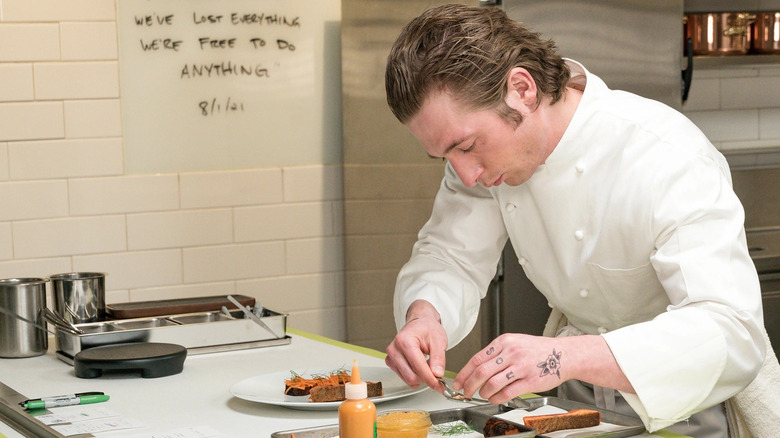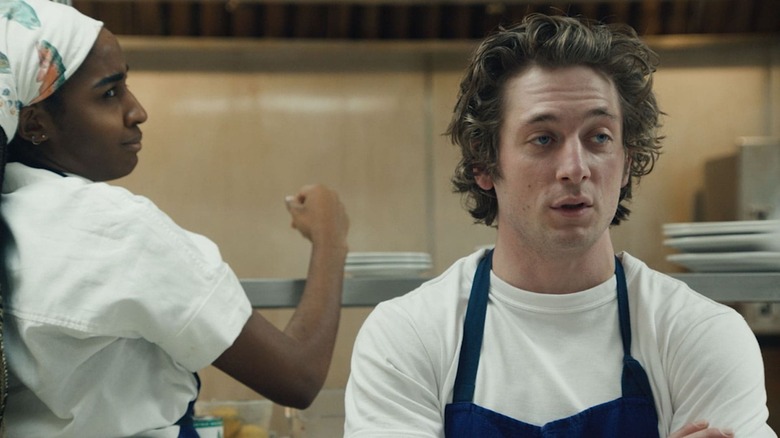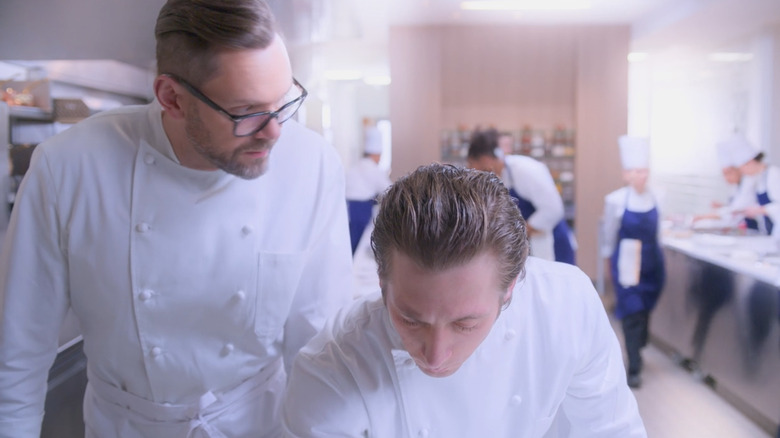How Jeremy Allen White Got His Kitchen Experience Preparing For The Bear
One of the best things about "The Bear" is how relatable it is for anyone who's worked in the food service industry. There are little things that aren't accurate — the scene where the restaurant gets a "C" in their food safety inspection can be nitpicked to death if you want to — but when it comes to capturing the general atmosphere of working in a kitchen, there are not many complaints.
As part of his preparation for playing Carmy, Jeremy Allen White spent two weeks at a "kind of crash course in culinary school," he explained to Uproxx. Then he got some experience working in an actual restaurant in Santa Monica, one where the chef had worked in Chicago for a long time. "I felt I could ask him a lot about the food scene specifically in Chicago," White said. As for his experience working in an actual kitchen? "It was incredible," he said. "They were all very welcoming. I just tried to show up and be respectful because I knew I wasn't going to be helpful."
He was only there for about a month, so it's not like White got anywhere close to the level of expertise of Carmy, who traveled the world for years learning to cook. But after the first few weeks of only working prep, by the end of the month, he'd learned enough to survive a regular shift in the restaurant:
"My last week or two there, they did let me work the line on Thursday nights, which is a pretty busy night. And it's an open kitchen ... all the diners, customers, they can see what's going on in the kitchen. So, that was very stressful, but it also gave me a lot of confidence that they put me in that position and didn't immediately take me off."
Uncut Gems in a kitchen
So, how are Jeremy Allen White's cooking skills today? "Still, not great," he told Uproxx. Luckily all he has to do is look like he knows what he's doing for "The Bear," not actually execute it. As he elaborated, "I can fake it well. I can move around well ... I hope we get to do more of the show and I just want to get better and better."
The most important part was not the cooking skills, of course, but capturing the stressful atmosphere the show was going for. White explained how "Uncut Gems," the 2019 crime thriller starring Adam Sandler as a man with a life-ruining gambling problem, was a big inspiration. "I think that was a movie that [writer/executive producer/director] Chris Storer and I spoke about in prep," he explained. "We wanted to kind of feel that anxiety throughout. The energy [is] really, really high."
It may seem kind of crazy for the writers and actors in a TV series about a bunch of cooks to be inspired by "Uncut Gems," but it makes sense even beyond the inherently stressful nature of the food industry. Carmy might be a cook, but he's also a gambler. Throughout the first season, he's throwing so much of his time and money into what looks like a dying restaurant, even after he realizes the sheer extent of how much debt his brother was in. As far as we know throughout most of the season, this is an objectively terrible decision that he keeps doubling down on. It adds yet another level of tension to the show, as the stakes for Carmy are far higher than just having a bad day at work.
The Bear's plea for change
A big benefit of the show's authenticity is the way it strengthens its commentary on the food industry as a whole. "The Bear" is always contemplating just how necessary all this screaming and yelling actually is. One of the most important scenes is a flashback in the second episode where Carmy's getting berated by his boss in a fancy Manhattan restaurant. Carmy's boss towers over him, delivering a string of insults with barely-restrained menace, like he's daring Carmy to talk back or break down.
It's a scene that feels like it was ripped straight out of Anthony Bourdain's first memoir, "Kitchen Confidential," where Bourdain described how an instructor at the Culinary Institute would scream at and insult his students for 10 minutes straight. Bourdain described it as the guy "breaking them down like everybody else until all that remained was a trembling little bundle of nerves." It was meant as a rite of passage, Bourdain assumed, a way to prepare them for the level of abuse that'd be regularly thrown at them throughout their culinary careers.
But the central question "The Bear" is interested in exploring is, "What if getting verbally abused at work doesn't have to be an inevitable part of working in a kitchen?" Although Carmy's fancy New York restaurant looks way nicer than his current one — it's certainly a lot cleaner — the show makes the case that this chaotic Chicago joint is the better one overall. At least here Carmy's trying to create a healthier atmosphere. Sometimes he fails terribly at his goal, but the season finale ends with the promise that things can get better. Making kitchen life less toxic is a tough task, but as Carmy goes into season 2, he's still going to try.


